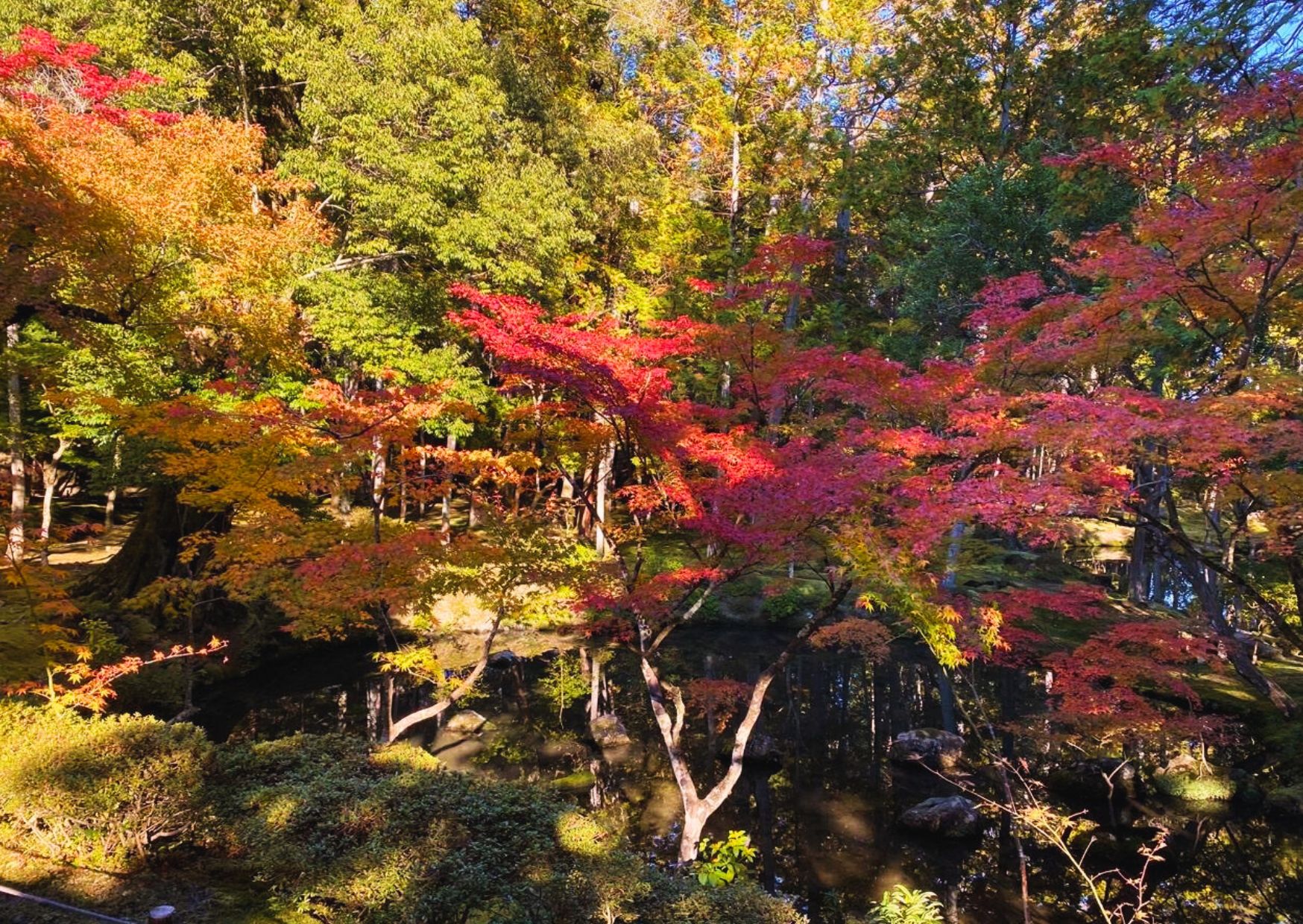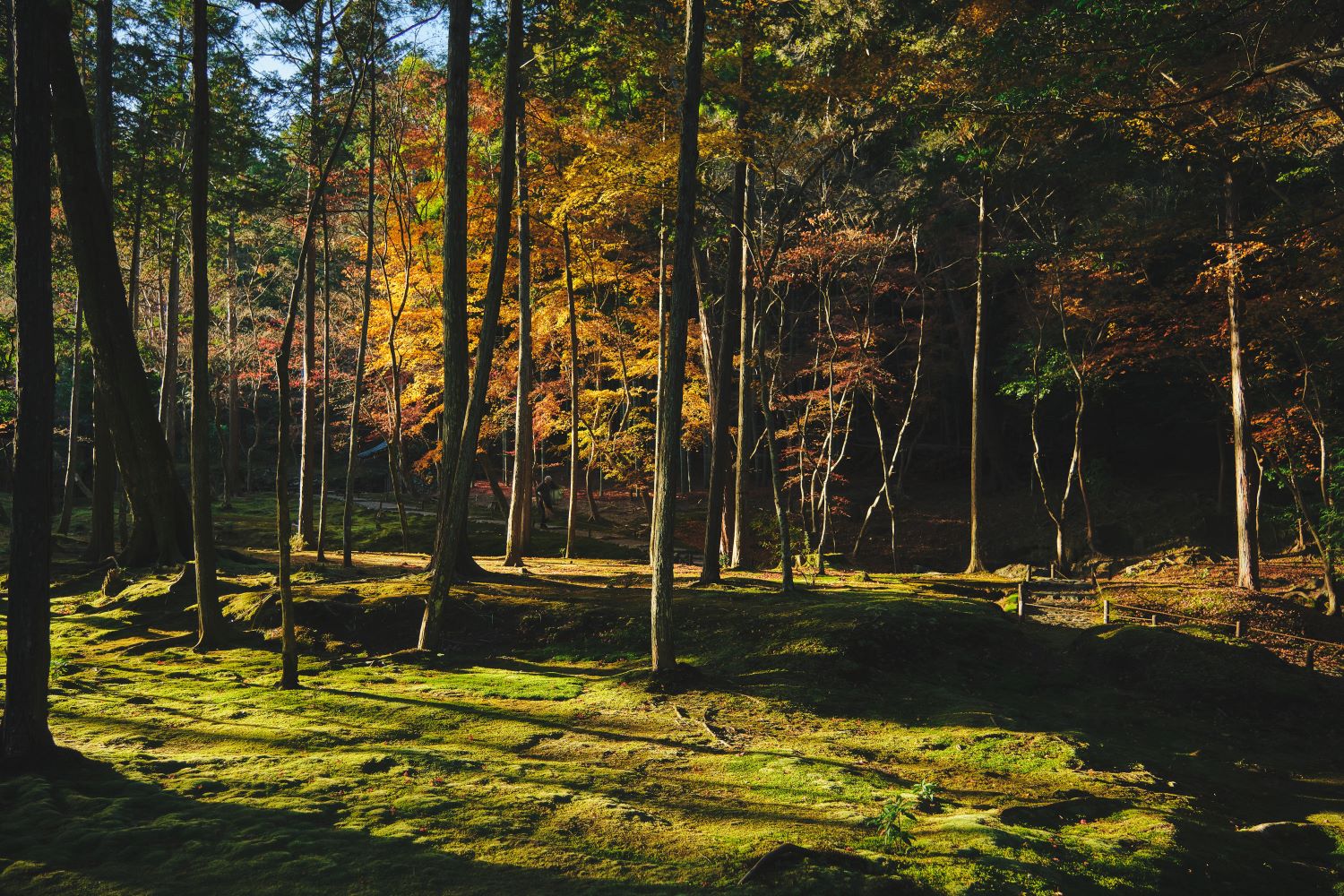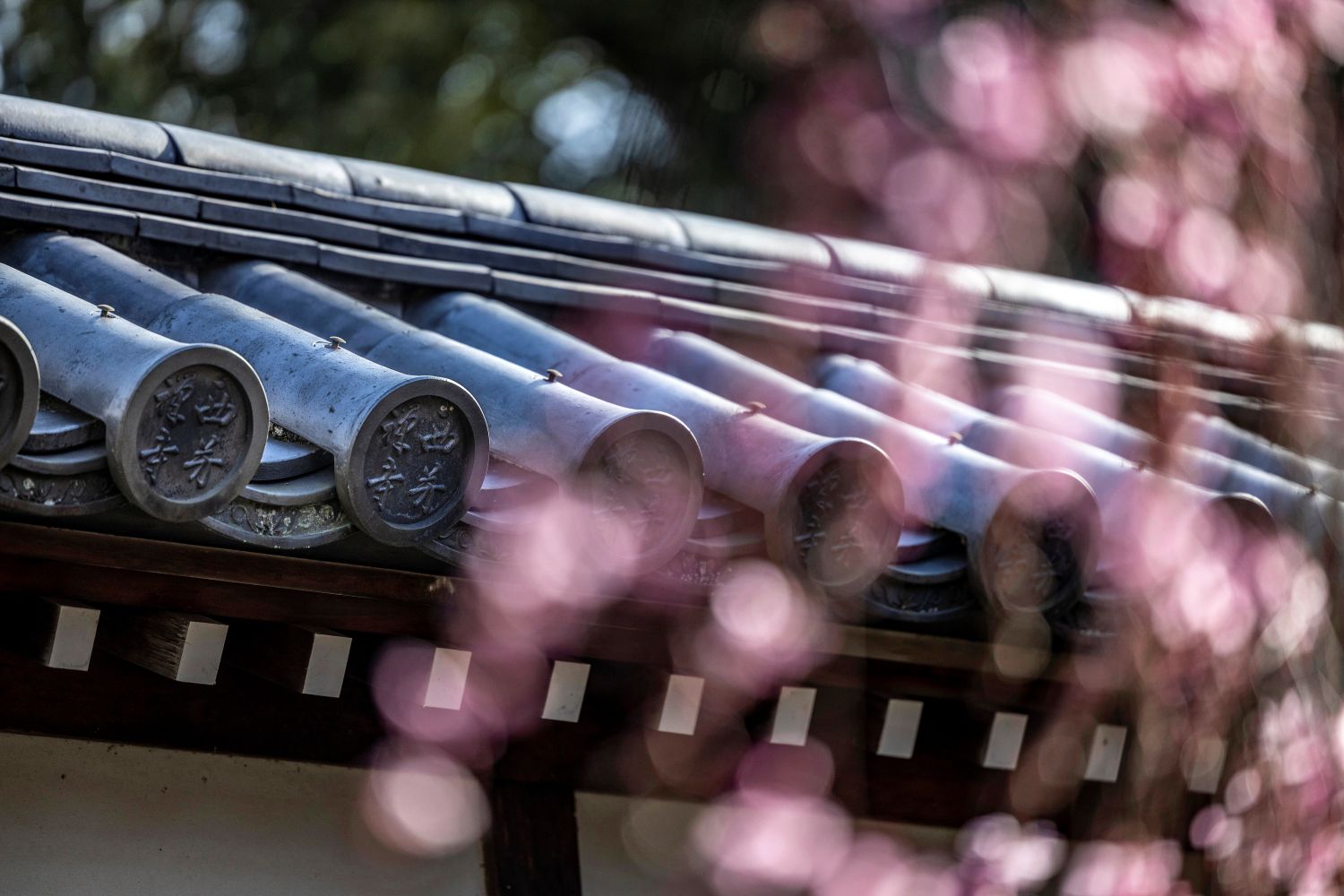2025.4.20
体露金風 西芳寺第十二景
ピーター・J・マクミラン
(翻訳家・詩人)
翻訳者であり詩人でもあるピーター・マクミラン氏が、西芳寺の魅力を綴る「体露金風 西芳寺」シリーズ。日本文化への造詣が深いピーター氏の感性と深い洞察が誘う、心の旅。ぜひ原文の美しい響きも、ご堪能ください。
冬だからこその美しさ
2月上旬の寒さの厳しい日、お庭はどこもかしこも冬モードです。西芳寺の特徴のひとつは、冬場はお庭に落ちた葉を掃き集めず苔を休ませていること。この時期に庭園を訪れると、まるで友人の家に来たかのような気持ちになります。居心地がよく生活感があるものの、お邪魔する前にしっかりと掃除を終えられなかったかのようです。
とはいえ、お庭を歩いていると、庭師の宮崎さんが池に膝まで入り、網にヒノキの葉を集めていることに気づきました。理由を聞くと、ヒノキの葉には油がついているため他の葉のように沈まず、池の表面に浮いてしまうのだといいます。風の影響も受けやすく、もし風が東に吹けば葉も東に流れていくため、葉を集めるタイミングはよく見計らわないといけないそう。冬だからこそ知れる裏話ですね。風の方角を読む経験を持つ庭師からしか聞けない、日常ではなかなか気づかない特別なお話です。
私は、冬のお庭の何が特別なのかを考え始めました。紅葉が散り去り、木々の輪郭が現れ、そして地面の形状や園路の起伏が明確になります。石敷や石組みがはっきりと浮かび、池のまばゆい銀の水は、雲で薄暗くなった空だけではなく、この世界のすべてを映し出しているかのよう。お庭は、衣服をすべて脱ぎ捨てたのです。本来の美しさをまとって佇み、隠すものは何もなく、すべてをさらけ出しています。
私は、兼好法師の『徒然草』が頭に浮かび、そこに記された始まりと終わりにみる美への見解と、その奥深さに関する記述を思い出しました。始まりと終わりはものごとの無常に関連しており、無常そのものが、私たちが感性を磨き人生が持つ深遠な意味に気づく基盤となるのです。
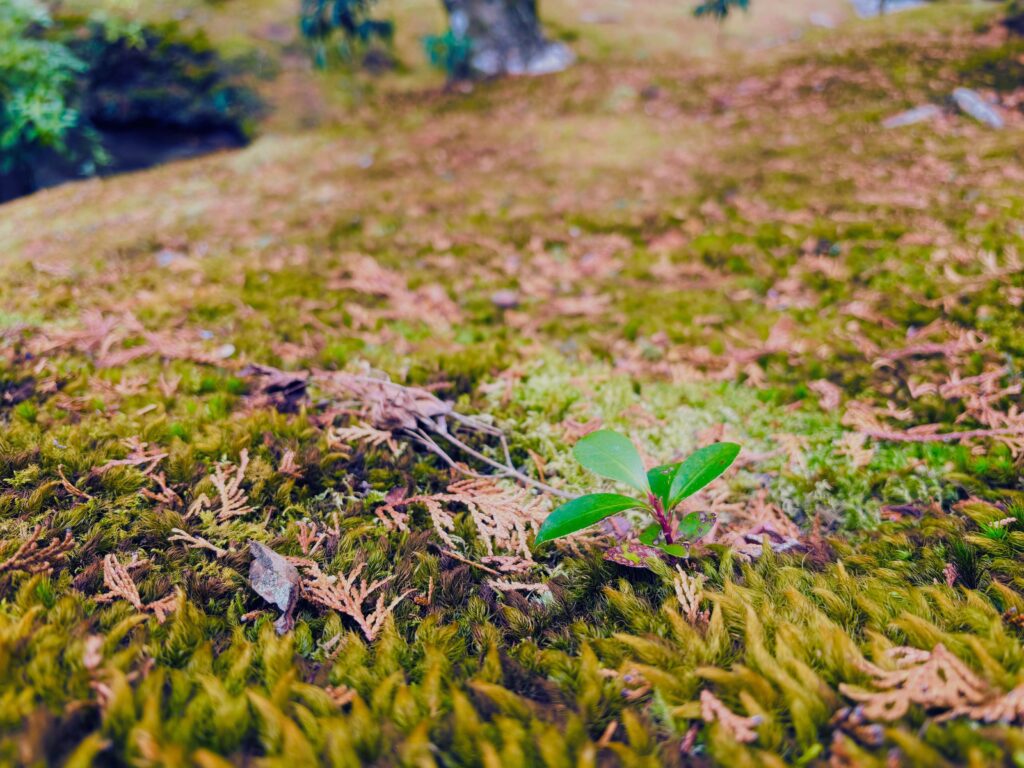
人々は、桜の季節や、木々が全盛のもみじで覆われている頃といった見頃の時期に、庭園に集います。しかし、それらほど分かりやすくなくとも、より奥の深い美しさが存在しています。お庭が本来のあるがままの姿を現したときの美しさ。終わりの美しさ、冬の美しさ。冬には、お庭そのものの姿が見えてきます。一目見ただけでは気づかないかもしれませんが、見えるようになってくると、その姿は私たちの心に残ります。私たちが尊び続けてきた花々やもみじの美しさを凌駕するような、そうでなくとも、それらに劣らぬものだと気づくでしょう。
私は常に、普段見向きもしない場所やものごとのなかに美しさを見出すことに、大きな喜びを感じています。今朝お庭を歩き学んだことは、美しさの形式は、私たちが期待するような決まったものではなく、数えきれないほど存在するということ。そして、美しさに対する認識は人それぞれであり、経験や人生のステージに大きく左右されます。
皆さんが大小問わず新たなものごとに美しさを見出すとき、必要なことは、ご自身の周りの世界に目を配ることだけ。世界は美しいもので溢れ、その姿を現す瞬間を待ちわびています。だから、自信を持ってご自身の感性を信じ、追い求め、磨いてください。苔庭は、皆さんの最初の師匠となるでしょう。
A Beauty Only Seen in Winter
It is a very cold day in early February and everywhere the garden is in winter mode. One of the special things about Saihoji is that it does not rake the leaves of the garden in winter to let the moss rest. When you visit in this season it is like visiting a good friend’s home. It feels very comfortable and lived in, but they have not had a chance to clean up completely before you came.
Having said that as I walk around the garden, I notice that the head gardener, Mr. Miyazaki, is in the pond up to his knees and gathering the leaves of the Japanese cypress tree in a net. When I ask him why he is doing so, he tells me that the leaves have oil in them so that they do not sink like other leaves but rather float on the surface of the pond. They also are affected by the wind, and if the wind blows east the leaves will blow east too, so he must plan well the timing for gathering them. It was an anecdote that I could only hear in winter. And only from the gardener who has the experience of reading the wind directions, something we hardly are aware in everyday life.
I started to wonder about what is special about the winter garden. The foliage is gone from the trees and their shapes become clear, the shape of the earth and the undulations in the garden path also become clear; the rock walkways and rock arrangements come into focus, and the shiny silver water in the pond seems as if it is reflecting everything in our world, not just the overcast sky. The garden has removed all her clothes. She stands there in all her natural beauty, fully exposed but with nothing to hide.
I recalled the Tsurezuregusa by Yoshida Kenko and how he describes the beauty of beginnings and endings and writes they are what are truly interesting. Beginnings and endings relate to the impermanence of things, and it is impermanence itself which provides a base for us from which to develop our sensibilities and appreciate the deepest meaning of life.
People flock to gardens at their peaks, in the cherry blossom season, or when the trees are covered in the glory of maples leaves. But there is another beauty, not so obvious, but deeper and more profound. It is the beauty that of the garden when she reveals her true and unadorned self. It is the beauty of endings, the beauty of winter, for in winter I feel we can see the true essence of the garden. We may not notice it at first sight, but when we become aware of it, it will stay with us forever and equal if not surpass the beauty of blossoms and maples that we have grown up to admire.
I am always very happy to find beauty in unusual places, times, or things. What I learnt from my walk this morning is that there are countless forms of beauty other than the ones we expect, and the appreciation of beauty is highly personal and very much affected by our experience and stage in life.
For you to discover beauty in new things, be they small or large, you need only to pay attention to the world around you. The world is filled with beautiful things waiting to reveal themselves to you, so I hope you will feel confident to believe in and pursue and develop your own sense of beauty. The moss garden can be a great first teacher.
Peter MacMillan ピーター・J・マクミラン
翻訳家・詩人。株式会社 月の舟(制作・翻訳会社) 代表取締役。
2008年に英訳『百人一首』を出版し、日米で翻訳賞を受賞。2016年9月には英訳『The Tales of Ise』(伊勢物語)、2017年には英訳『One Hundred Poets One Poem Each(新訳)』の2冊がPenguin Booksより出版される。近著に『日本の古典を英語で読む』『英語で味わう万葉集』など著書多数。2019年より朝日新聞にて「星の林に」、2022年より京都新聞にて「不思議の国の和歌ワンダーランド 英語で読む百人一首」を連載。
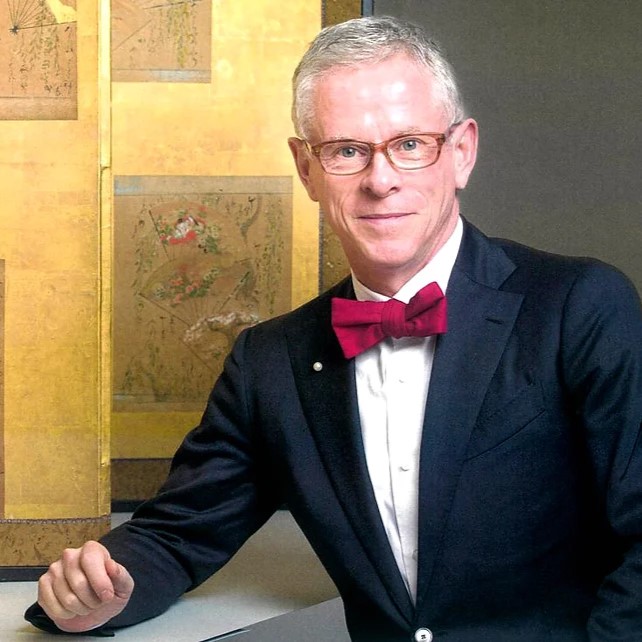
翻訳:福田安奈


